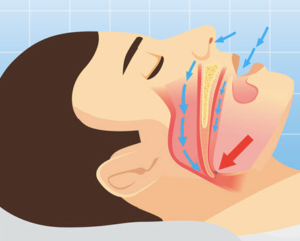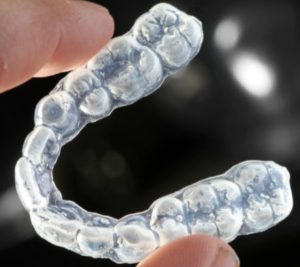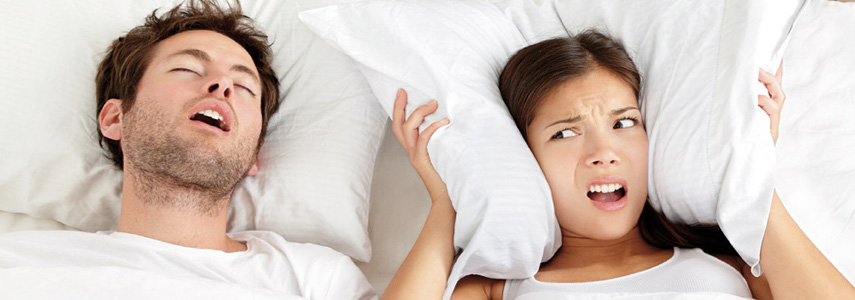Snoring is a widespread problem, as well as being a disorder that can lead to complications for those who suffer from it, it is also a tremendous annoyance for those who sleep next to it. In addition to not enjoying good sleep quality, those suffering from rhonchopathy can suffer from cardiovascular diseases and severe sleep apnea.
Why do you start snoring?
Snoring is a mechanical phenomenon, it occurs when there is a loss of muscle tone in the soft palate and a backward movement of the tongue. These conditions obstruct the fluid passage of the air in the first airways and cause soft tissues to vibrate, the resulting noise is that of snoring.
Snoring: what complications?
 Obstruction of the upper airways can generate prolonged sleep apnea, breathing stops for a few seconds and sleep stops when you catch your breath. This dynamic can occur up to 300 times per night.
Obstruction of the upper airways can generate prolonged sleep apnea, breathing stops for a few seconds and sleep stops when you catch your breath. This dynamic can occur up to 300 times per night.
Nocturnal apneas, in addition to generating continuous interruptions of the night’s rest, can give rise to cardiovascular diseases such as stroke or hypertension over time.
Sleep apneas should not be underestimated as they can lead to serious cardiovascular complications.
Snoring may seem like a relative disorder, but it is essential not to neglect it.
There are lifestyle habits that can help reduce the phenomenon:
- follow a healthy diet;
- practice sports;
- avoid drinking and smoking;
- sleep on one side and not on your back.
How dentistry can make you stop snoring
A dental solution to the snoring problem can be determined by applying a dental bite to wear at night.
As we have repeatedly repeated in the pages of our blog, each clinical case is unique, so standard solutions may prove to be non-resolving.
To be effective, the dental bite must be made on the specific anatomy of each patient, which is why it is important to contact an excellent dental center.
The structure of the bite consists of two elements and has the purpose of keeping the tongue in the right position with respect to the palate, thus promoting correct breathing and avoiding the vibration of soft tissues.
In the early stages of treatment, “coexistence” with the night bite is likely to give rise to muscle pain during the day, but it is a transient condition that disappears in a few days.
Contraindications of the anti-snoring bite
The advantage of contacting an excellent dental center is, among others, that you have the guarantee of being able to proceed with dental treatment without incurring particular complications.
In fact, there are clinical conditions for which the application of a dental bite is contraindicated, in particular:
- presence of periodontitis;
- gum infections;
- mobility of one or more teeth;
- absence of one or more teeth.
There is also to consider that the problem can be solved with a bite only if snoring depends on a condition of the oral cavity. The bite is instead ineffective if snoring depends on other pathologies, for example purely respiratory ones (sinusitis, nasal polyps, adenoids …).
















